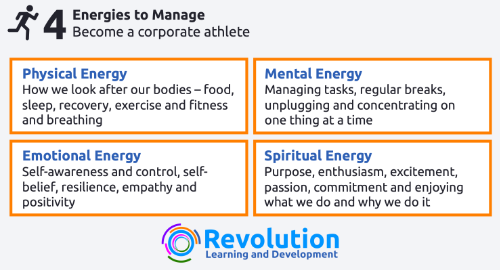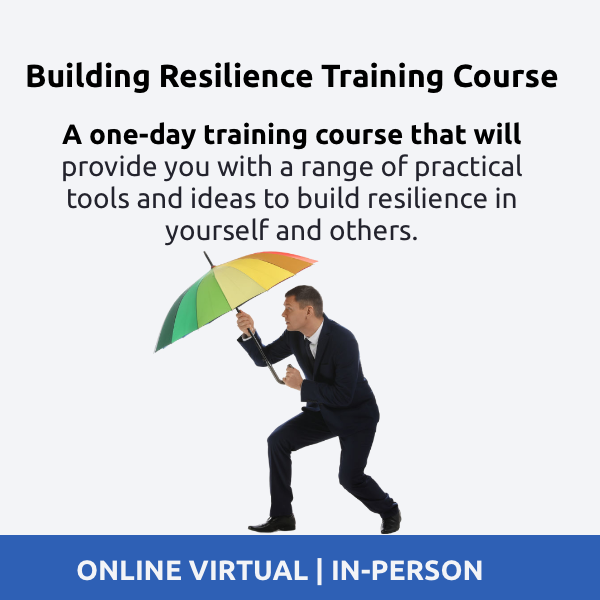Background
With the buzz of the Olympics back with us again, it reminded me of the principle of being a corporate athlete. Dr Jim Loehr and Tony Schwartz developed the idea of corporate athletes and likens how successful we are at work and in business to how high performing athletes achieve great success.
The success of a corporate athlete comes from how successfully we manage our energy. You may have been told that you need to manage your time or manage your budget. Here, we look at how to manage different types of energies to lead us to success.
Sports Athlete Vs Corporate Executive
Before we look at how to become a corporate athlete, let’s initially look at the differences between a sports athlete and a corporate executive (a nice term for you and me as the leader or manager of our own business or a team in a business).
Sports Athlete
A sports athlete:
- Spends 90% of their time training and perfecting the skills that they need to compete at the highest level in their discipline.
- They spend 10% of their time performing their discipline where their success is measured.
- They have a good proportion of the year (sometimes 4 to 5 months) in the down-season where they rest and recuperate.
- Their career is short – sometimes only around 5 to 10 years
Corporate Executive
A corporate executive
- Spends 90% of their time (or more) performing the tasks they get measured on
- Spends less than 10% of their time training and developing their skills
- Works long hours and has a long career
- Has a fixed number of holidays a year where they probably don’t actually switch off at all
What is a Corporate Athlete?
Loehr and Schwartz recognised that in order to become successful, corporate executives should look to train, learn and follow the approach of the sports athlete. In other words, they should become a corporate athlete.
At the heart of the principle of being a corporate athlete is energy and how well we manage 4 different types of energy:
- Physical energy
- Mental energy
- Emotional energy
- Spiritual energy
How to Become a Corporate Athlete
To become a corporate athlete, we must learn to manage the 4 energies described in the previous section.

Physical Energy
Physical energy is related to how we look after our bodies. To become a corporate athlete, we must consider:
- The food we put into our bodies – eating healthily and drinking plenty of water
- The number of times we eat – only eating when we are hungry
- Getting the right amount of quality sleep
- Giving ourselves downtime to rest and recover
- Getting plenty of exercise
- Concentrating on our breathing (also known as patterns of breathing)
We know that we need to do all of the above to sustain a healthy lifestyle, but they are also incredibly important to our overall success in business too.
Mental Energy
Mental energy is related to how we look after our workload and tasks, To become a corporate athlete, we must consider:
- Taking regular breaks throughout the day
- Not becoming fixated on one task
- Varying the tasks that we do to maintain interest
- Not tiring our mind with too much going on, but instead being able to find ways to concentrate on one thing at a time
- Creating a good work/life balance
We want to be stretched and challenged, but we need to do this in such a way that doesn’t lead to mental burnout. Managing our time is a key component of this. See our time management training course for more.
Emotional Energy
Emotional energy is related to how we feel about ourselves and how we respond to challenges from others. To become a corporate athlete, we must consider:
- Being self-aware and emotionally intelligent – recognising how our behaviour impacts others and the influence we have on their behaviour
- Having self-control and not allowing our emotions to influence our own behaviour and attitude
- Being resilient to the challenges we face to maintain a positive outlook and attitude
We need to be able to remain positive and in control at all times. When we allow things to impact us in a negative way, we feel negative and therefore our actions become negative. See our Building Resilience training course for more on this.
Spiritual Energy
Spiritual energy is related to how we look after our minds. To become a corporate athlete, we must consider:
- Having a purpose – understanding why we are doing what we do
- Enthusiasm, excitement and passion for the tasks and work that we do
- Being committed to the tasks and being successful
Knowing that we are making a difference and having goals and purpose will help sustain positivity in what we do. To become a great corporate athlete, we must find the good and the benefit to us in everything that we do to give us that sense of purpose.
Further Learning
You can learn more about becoming a corporate athlete in the book The Corporate Athlete by Jack Groppel or read the paper The Making of a Corporate Athlete by Tony Schwartz on Harvard Business Review.












